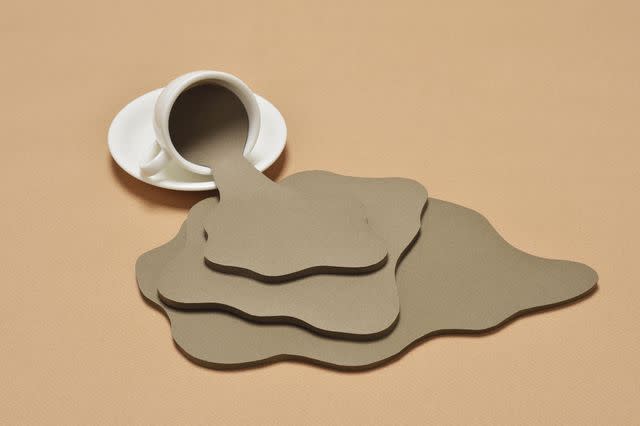Does Coffee Cause Inflammation? We Asked RDs
Here's what you need to know about the inflammatory effects of consuming coffee drinks.
Waking up with a cup of coffee may be your tried-and-true morning ritual—but does coffee cause inflammation? Inflammation, especially over time, has been a hot topic for those looking into healthy eating and living practices.
We talked to registered dietitians to unpack the connection between coffee drinks and inflammation. Here's what you should know about how your morning cup could impact your immune system's inflammatory response.
Meet the Expert
Lyssie Lakatos, RDN, and Tammy Lakatos Shames, RDN, are registered dietitians and personal trainers who are known as The Nutrition Twins.
What Is Inflammation?
Inflammation is the immune system's response to an irritant, according to Lyssie Lakatos, RDN and Tammy Lakatos Shames, RDN. It occurs when the body recognizes and works to remove harmful components to begin the process of healing.
There are two types of inflammation: acute and chronic. “Acute inflammation is a response to sudden damage in the body, like a sprained ankle, where the body sends inflammatory compounds to the injured area to protect it," says Lakatos. "Chronic inflammation is when your body continues to send inflammatory compounds even though the body is no longer in danger, and it starts to damage the body’s tissues and cells.”
Inflammation may cause symptoms such as redness, swelling, heat, and pain. Chronic inflammation, or long-term inflammation, is also linked with chronic diseases like rheumatoid arthritis (RA) and systemic lupus erythematosus (SLE). Additionally, chronic inflammation can cause weight gain and complicate weight loss for people who are trying to shed some.

Yagi Studio/Getty Images
Coffee's Link to Inflammation
Whether or not coffee causes inflammation depends largely on your coffee drinks (and additives) of choice—as well as your genetic predispositions. For some people, drinking black coffee, both hot and iced, may actually help acute or chronic inflammation, not cause it to flare up. In other cases, coffee drinks may promote inflammation.
Black Coffee Benefits
“Coffee actually seems to reduce inflammation and not cause it,” says Lakatos. “Coffee’s unique mixture of compounds and antioxidants, like chlorogenic acid, caffeine, cafestol, kahweol, and trigonelline appear to play a part in reducing inflammation."
In fact, coffee contains over 1,000 bioactive compounds, and it is a particularly good source of polyphenols. Polyphenols are compounds that boast substantial antioxidant and anti-inflammatory properties. They appear to prevent free radicals from causing damage that can bring on inflammation, and they may also block the production of inflammatory compounds altogether.
According to Lakatos, beyond reducing inflammation, drinking coffee can also help reduce the risk of some inflammation-induced diseases, like heart disease and diabetes.
Impact of Sweeteners
While drinking your coffee plain may have anti-inflammatory benefits, adding sweeteners or dairy products (i.e., sugar, syrup, cream, or a whipped topping) can trigger pro-inflammatory cytokines. Cytokines are the regulators of your body's response to inflammation, as well as infections and trauma. While they're not all bad, pro-inflammatory cytokines can worsen diseases.
“Additives like sugar cause low-grade chronic inflammation that is linked with autoimmune disease and other chronic diseases,” says Lakatos. In other words: That caramel macchiato and vanilla bean frappuccino aren't quite like a cup of black brew.
Caffeine Sensitivites
It's also important to note that plain coffee does not necessarily have anti-inflammatory effects for all people. “Keep in mind that some people are genetically inclined to be sensitive to caffeine, and for these people, coffee may create inflammation due to its caffeine content,” says Lakatos.
Caffeine can increase cortisol levels and take a toll on sleep, and stress and sleep deprivation can both cause inflammation. So for people who are sensitive to caffeine, the risks may outweigh the rewards.
Tip
For healthy adults, the U.S. Food and Drug Administration (FDA) recommends drinking no more than 400 milligrams of coffee a day (or about four or five cups). If you're sensitive to caffeine, consider decaf coffee instead. Decaf coffee is still packed with polyphenols, which offer anti-inflammatory benefits. So you can still reap the potential perks without consuming all the caffeine.
Anti-Inflammatory Coffee Tips
For those seeking tips for sweeter coffee sans the inflammation, The Nutrition Twins suggest a sprinkle of cinnamon for natural sweetness. Cinnamon also increases the antioxidants in your cup.
Adding a splash of unsweetened almond milk or another nut milk shouldn’t negate the anti-inflammatory benefits of coffee either. “Just don’t overdo it on your coffee servings, especially if you are jittery after drinking caffeine,” adds Lakatos. “Moderation is the key.”
If you’re sensitive to coffee altogether or just not a fan, The Nutrition Twins also recommend green tea, which is extremely anti-inflammatory, as well. “Although there is caffeine in green tea, it is much lower than in coffee, and the polyphenols in green tea have potent anti-inflammatory properties," says Lakatos.
Related: How to Start Eating More Anti-Inflammatory Foods—and Why It's So Important
For more Real Simple news, make sure to sign up for our newsletter!
Read the original article on Real Simple.

